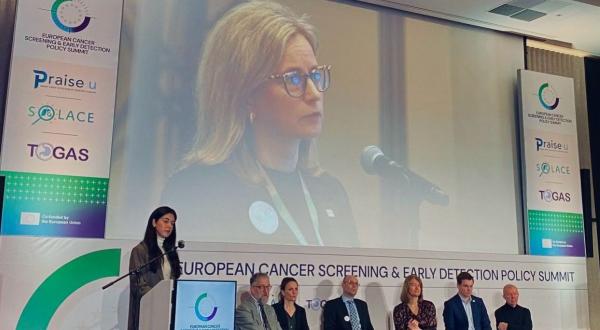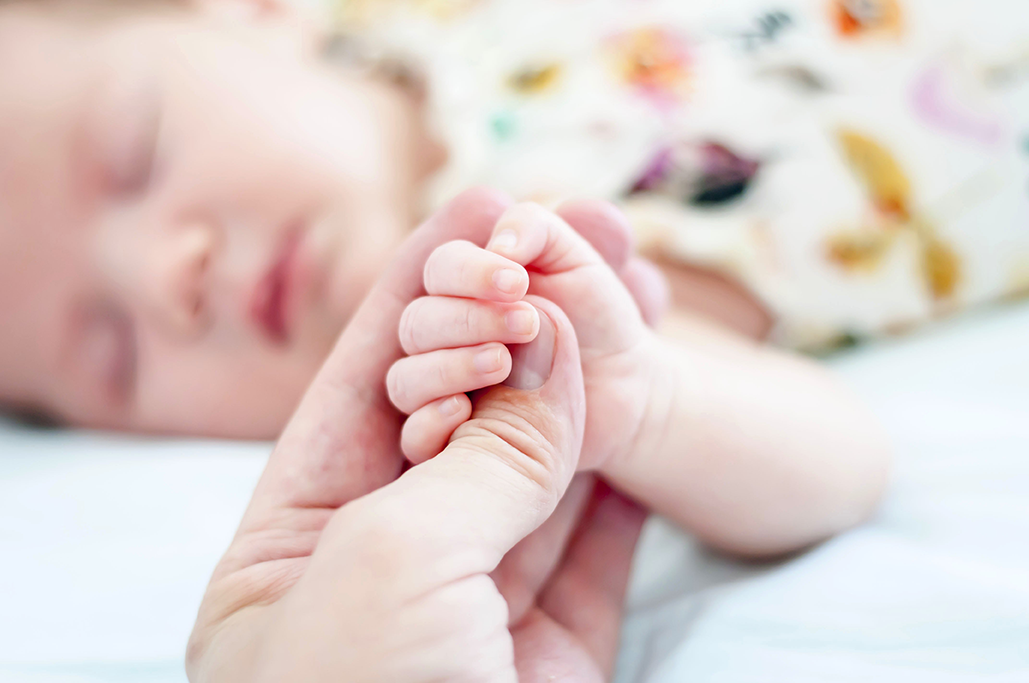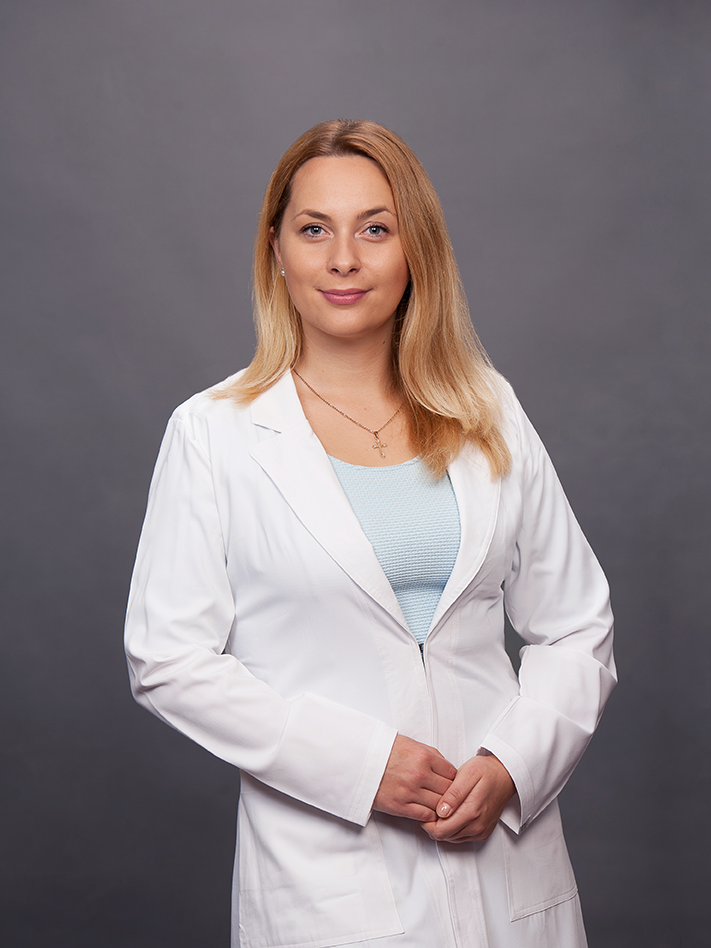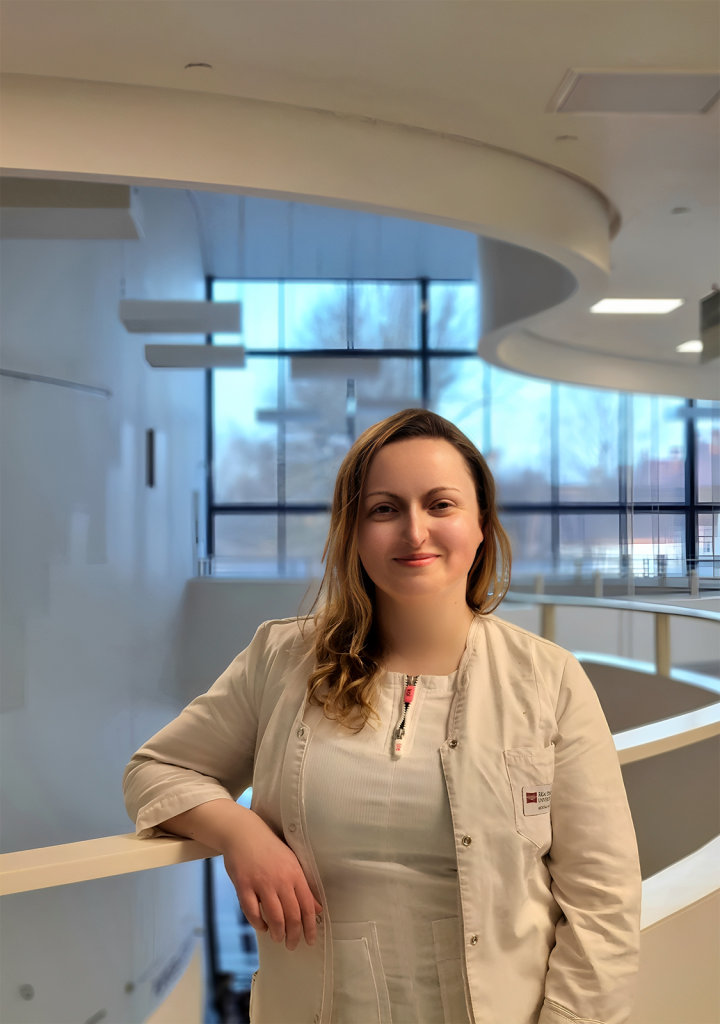RSU Conducts Extensive International Study on Maternity Care in Latvia
‘We want women to leave the maternity hospital satisfied and to return there’ – this is the aim of an ambitious international study on the care of women and children by gynaecologist Elizabete Pumpure. She has just completed her residency studies at Rīga Stradiņš University (RSU) and is a lecturer at the RSU Department of Obstetrics and Gynaecology, as well as the leader of this research project. The IMAgiNE EURO1 study aims to evaluate and improve maternal and child care. It is being carried out in 22 European countries since 2020 and looks at different aspects of maternity care.
In Latvia, the project is coordinated by RSU and the project team includes experienced researchers such as Professor Dace Rezeberga, as well as RSU students and residents. Sixth-year medical student Dārta Jakovicka and resident Elīna Voitehoviča have compiled abstracts on women's experiences of care and access to breastfeeding support at maternity facilities and presented their study at RSU Research Week 2023, Women's and Children's Health session of the Knowledge for Use in Practice conference.
The first project of its scale in Europe
The study started in 2014 when the World Health Organisation (WHO) identified the challenges of maternal and child care in Europe and developed recommendations for a positive birth experience two years later. A questionnaire was developed based on these recommendations with 40 criteria covering four sections – an assessment of the quality of care, the availability of human resources and infrastructure, and changes related to Covid-19. For example, the questionnaire included questions on physical and emotional abuse during childbirth, uncoordinated manipulations, problems with breastfeeding, not being allowed to be with the new-born in the first hours after birth or not being allowed to be with a partner in the maternity hospital.
Women in Latvia were asked to both fill in the questionnaire and share it on social networks. This was the approach to selecting respondents in all the countries participating in the study. The questionnaire is currently available in 25 languages, and the aim is to get a full picture reflecting the situation in Europe. The survey has no specific time frame – it was launched in 2020 and countries are still joining.
RSU joined the study on Pumpure’s initiative thanks to her international experience and wide range of contacts. Pumpure explains the origins of the project: ‘A Slovenian professional I know shared this questionnaire on the internet. I was impressed that Slovenia had a study like this considering they are as small as Latvia! With the support of the Head of the Department, Prof. Rezeberga, we completed all the formalities and Latvia joined the study through RSU. It is important to ensure continuity in our research team, so we involved residents and medical students, as well as prospective midwives in the study,’ said Pumpure.
Issues to be addressed in Latvia include abuse during childbirth and breastfeeding support
The study has only been running for two years. Currently, data is being collected on births from March 2020. There are plans to continue the study, however, certain conclusions on maternal and child health care can already be drawn. According to Pumpure, the main benefits of the study include the opportunity to identify problems in maternity care and therefore take informed action to prevent them, gain international experience from peers in other countries, and compare data as it is being collected and processed by the project's lead partners in Italy. The study also allows for an assessment of the situation and changes in obstetric care over time, not only during the COVID-19 pandemic but also after.
‘It is very important to translate women's experiences into objectively measurable data. The results of the study can be useful for medical institutions, health policy makers, and educational institutions that train health professionals. Likewise, this data is also useful for women to know their rights and what good care should look like when they go into labour. How can a first-time mother know what she needs to ask if there is no one to tell her?’ explains Pumpure.
According to the study, about 17% of women have been physically, verbally or emotionally abused during childbirth. Lack of emotional support was mentioned by around 30% of respondents.
More than 35% of respondents think that support persons should spend more time with the new mother. Insufficient support for breastfeeding was one of the most worrying issues and points to a major problem: 32.7% of women admitted that help was not always available and that there was no information on the benefits of exclusive breastfeeding.
‘The results were surprising to me as a practitioner, as it always seemed that breastfeeding was supported in Latvia, but the data from the survey proved me wrong. We can conclude that what we are doing now is not effective enough and we need to think of other approaches,’ says Pumpure. ‘It is also worrying that 60-70% of mothers do not know what to do if they experience bleeding or get a fever after giving birth, or what the warning signs are that their baby's health is deteriorating. A relatively simple solution would be to provide an informational leaflet to complement the information provided by their doctor.
At RSU Research Week, the student participant Jakovicka will report on women's experience of maternity care up until October 2021: ‘In the survey, respondents could freely describe their experiences and give recommendations. This is the section we decided to analyse this year. I analysed the qualitative data and worked through the comments, some of which were shocking descriptions of women's experiences of childbirth. I will mention one comment that reflects a big problem in healthcare, namely the lack of communication between doctor and patient, pointing out the importance of medical professionals displaying a kind and caring attitude towards new mothers: "The medical profession should not only emply people with the right education, but also people who love their work, are warm, responsive and able to communicate with patients”.’
When asked how Latvia looks compared to other European countries, Pumpure says that
the study shows a trend towards lower rates of abuse and other problems in maternity care in Western European countries. ‘No country is perfect, but Latvia is in the middle (17%) in terms of abuse. The situation here is not the worst in Europe, but there is definitely room for improvement.’
Some of the countries that exhibit better rates are Norway (8.1%), Luxembourg, Switzerland (9.6%), and Slovenia (11%), for example, and those that exhibit worse rates include Bosnia-Herzegovina (30.5%) and Serbia (23%).
Internationality
‘One of the studies advantages is that all participating countries use the same survey. This allows researchers to look at and compare indicators in all 40 categories. The data from the survey shows which countries are doing better and which countries we can ask to share their experiences so that we can improve our clinical practice. We have a wide network of contacts and we are free to approach colleagues in other countries with questions. Numbers alone often tell us nothing and we need to understand what methods and tools we can work with today to improve the situation. This network of researchers is a very valuable asset,’ says Pumpure.
The global significance of the study is reflected in the fact that last December The International Journal of Gynecology & Obstetrics published a special issue dedicated to it with three joint articles and seven articles by researchers from individual countries, including Latvia.2
Future of the study – larger database and a survey of medical practitioners
45,000 surveys have already been obtained during the study, among them 2,079 from Latvia, which is a large number considering the size of the population. ‘The study definitely needs to continue in order for us to see if other trends emerge post-pandemic. The next steps would include informing health professionals about the problems we find and sharing the experiences of new mothers. There is also a need to work with peers in other countries to share experiences and improve overall maternal and child care across Europe. It is our duty to make women feel heard and to follow up with action to improve the situation,’ says Jakovicka.
Pumpure notes that the data does not reflect the childbirth experience of all Latvian women, although the study analysed 5-7% of the total number of births in 2020 and 2021: ‘As the questionnaire was distributed only online - via social networks, various forums, and with the help of influencers, 75% of the respondents have a higher education and come from Riga. We did not reach patients in rural areas and those with lower levels of education. Reaching them is an important part of developing the study. We want to involve the maternity wards of regional hospitals.’
The doctor outlines another challenge in the future: ‘This study has a 360-degree focus – we are not only interviewing the women giving birth, but also healthcare professionals. Unfortunately, healthcare professionals are not very responsive in Latvia and we are currently working on reaching them. We want to find out how they evaluate their knowledge and how they feel in their workplace. This is important because a positive birth experience starts when a healthcare professional enters the workplace. This aspect is also highlighted in the WHO guidelines: employers should take care of their staff. If employees do not feel comfortable in their workplace, there can be communication problems in stressful situations, both among staff members and while communicating with a woman in labour and her family.’
1 The IMAgiNE EURO project (Improving MAternal Newborn Care in the EURO Region) is coordinated by the WHO Collaborating Centre Istituto di Ricovero e Cura a Carattere Scientifico (IRCCS) Burlo Garofolo in Trieste, Italy.
2 The article on the situation in Latvia was written by Elizabete Pumpure, Dārta Jakovicka, Agnija Vaska, Gita Jansone-Šantare, Anna Regīna Knoka, Katrīna Paula Vilcāne and Prof. Dace Rezeberga.
Related news
 RSU Professor Maija Radziņa represents Latvia at EU cancer screening summitResearch, International Cooperation
RSU Professor Maija Radziņa represents Latvia at EU cancer screening summitResearch, International Cooperation





